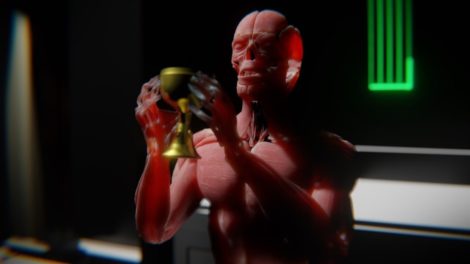Virtual Cinema: A Glitch in the Matrix
Front Row at the Movies by Shirrel Rhoades
[mr_rating_result]Are you really sitting there reading this review? Or it is all a simulation like in “The Matrix”?
Simulation theory is the concept that all of reality could in fact be an artificial simulation, such as a computer game or AR headset. What if you’re just a computer-generated avatar, like in that sci-fi movie, “The 13th Floor?” That’s the one where a computer scientist running a virtual reality simulation of the year 1937 discovers that he himself is part of a computer simulation.
You might be surprised to learn that the first person to state the basic concept of reality as a simulation was Plato. In his famous “Allegory of the Cave,” he described people imprisoned since childhood who are led to believe that shadow puppets are real rather than fabricated illusions.
Kind of like watching a movie and confusing it with real life.
Or sort of like a virtual “Truman Show.”
This thinking is akin to solipsism, the philosophical idea that the external world cannot be known and might not exist outside your own mind.
 Descartes played with simulation theory in his epistemological Evil Demon hypothesis. Here, he postulated that a demon could conjure up a complete illusion of an external world. “I shall think that the sky, the air, the earth, colors, shapes, sounds and all external things are merely the delusions of dreams which he has devised to ensnare my judgement. I shall consider myself as not having hands or eyes, or flesh, or blood or senses, but as falsely believing that I have all these things.”
Descartes played with simulation theory in his epistemological Evil Demon hypothesis. Here, he postulated that a demon could conjure up a complete illusion of an external world. “I shall think that the sky, the air, the earth, colors, shapes, sounds and all external things are merely the delusions of dreams which he has devised to ensnare my judgement. I shall consider myself as not having hands or eyes, or flesh, or blood or senses, but as falsely believing that I have all these things.”
Simulation theory is the subject of a new documentary called “A Glitch in the Matrix.” Rotten Tomatoes describes the film as “a thought-provoking portrait of digital culture and its relationship to reality.”
Directed by Rodney Ascher, the subject matter should not be too surprising to those familiar with his previous offerings:
– A short doc called “The S From Hell” (2010), which was designed to instill the same fears in its audience that children felt viewing the 1964 Screen Gems logo (trust me, it was subconsciously scary).
– Or his “Room 237” (2012), a documentary which explored the many eerie interpretations of Stanley Kubrick’s “The Shining.”
– Or “The Nightmare” (2015), a film which focused on the frightening topic of sleep paralysis, something he himself had experienced.
Ascher’s “A Glitch in the Matrix” explores the idea that “consciousness may mean we are being inhabited by some sort of player-type intelligence” … like in a computer game.
Ascher makes his case with a hodgepodge of archival footage, colorful animations, interviews with real people whose identities are obscured by silly digital overlays (avatars), and “a collection of cases from some of our most iconoclastic figures in contemporary culture …”
For example, “A Glitch in the Matrix” relies heavily on observations by Nick Bostrom, the Swedish-born philosopher who reasons that we all probably live in a simulation.
Elon Musk weighs in too, projecting that computer games soon will become indistinguishable from reality.
 Also, we meet the late sci-fi author Phillip K. Dick, whose work was concerned with questions about the nature of reality, perception, human nature, and identity. In the late ‘70s, Dick gave a talk where he shared his theory that we are living in a simulation. His ramblings are interspersed throughout the film’s two hours.
Also, we meet the late sci-fi author Phillip K. Dick, whose work was concerned with questions about the nature of reality, perception, human nature, and identity. In the late ‘70s, Dick gave a talk where he shared his theory that we are living in a simulation. His ramblings are interspersed throughout the film’s two hours.
Dick suggested that déjà vu is merely a glitch in the matrix that lets you sense the artificiality of your existence.
One such glitch is called the Mandela Effect – a theory based on the fact that many people remember Nelson Mandela dying in prison, even though that never happened. Tens of thousands of similar false memories have been recorded. Dick believed these “memories of a different presence” come from living in an alternate timeline.
Of course, you can’t mention simulation without discussing the three “Matrix” movies. And this documentary does that ad nauseam … right down to comparing Neo’s eyes hurting when he’s taken out of the Matrix to the reactions of those people emerging from Plato’s Cave.
Heavy stuff, huh?
Some moviegoers didn’t buy in. One complained, “These various talking heads likely didn’t have a college degree between them, let alone a PhD. Some seemed genuinely deluded and in need of mental health intervention … basically just a bunch of basement dwelling fantasists with way too much time on their hands talking nonsense to the camera.”
Another said, “Literally two hours of uninteresting, non-sequitur anecdotes told by idiots who don’t even comprehend the very thing they think they’re explaining.”
Still another lamented, “I wanted this to be so much better. Now, I just don’t care. Thanks for turning me apathetic. Skip this if you have better things to do, like watch paint dry.”
If not deterred, you can catch “A Glitch in the Matrix” on such streaming video platforms as Amazon Prime, Vudu, Fandango, and Apple TV … or in movie theaters like Tropic Cinema.
As one of the film’s experts concluded, “I believe that this thought, that we’re living in a simulation … is going to just increase in popularity.”
Thought provoking, yes. Mind bending, that too. Worrisome, you bet.
But then again, are you sure I’m real?
As the Tropic reopens with caution, please familiarize yourself with the protective house rules and procedures. Got questions? Email info@tropiccinema.com.
Email Shirrel: srhoades@aol.com


Ratings & Comments
[mr_rating_form]